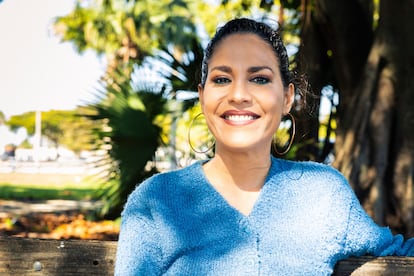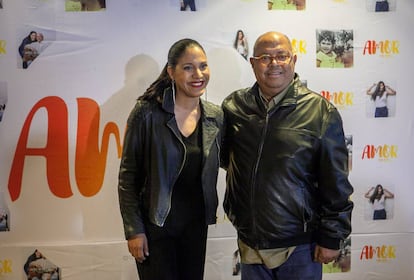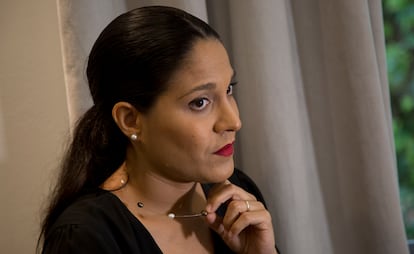Haydée Milanés, singer: ‘It hurts me to see how Cuba is becoming more devastated every day’
The artist – also the daughter of Pablo Milanés – recently released ‘Duele’ alongside Cuban rapper El B. It’s meant to be a new song for a free Cuba. She spoke with EL PAÍS from her exile in Miami


Haydée Milanés carries around a lot of pain. She doesn’t boast about it, but when asked, she can recall everything that she’s sad about, without hesitation.
The singer is grieving over the death of her father — the singer-songwriter Pablo Milanés — who passed away two years ago. She’s grieving over her exile from Cuba. She’s grieving for her mother, Zoe Álvarez, who she left behind on the island.
Haydée is also grieving about not being able to sing in Cuba. And, more than that, she’s grieving about Cuba itself: a pain so great, so definitive, that it seems to contain all the other kinds.
A few days ago, she released a music video for the song that provides a soundtrack to her pain. After six years without recording and nine without releasing a music video, Milanés, 44, composed Duele (translated as “It hurts”) with Cuban rapper El B, who’s a former member of the legendary duo Los Aldeanos. The song is featured on the album that she’s working on with producers Yadam González and Eduardo Cabra.
From Miami — where she emigrated in 2022 — the Havana-born Milanés has released a single with many meanings. It’s an ode to love and sadness, as well as to her homeland and her mother. It’s both a whisper and a cry.
“What we did with this song was to inject strength, desire and a decree of freedom, of hope. The belief that we’ll succeed in liberating the country, rescuing it. That country is ours,” the singer says. “This is a song to God, to Oshun, the patron saint of Cuba. It’s a song that asks the greatest thing that exists to show us how to escape this nightmare and be able to have a country.”
Duele also represents Milanés' foray into the music scene beyond the island. “I’ve been breaking the ice from a space like Miami, where I didn’t know if I would be able to record again, or have the means to afford it,” she sighs. “I really needed to talk about Cuba in my music. I was doing it in my social life, but I wanted to include it in my songs, my lyrics. There was a magical encounter with El B, a spiritual connection regarding our love for Cuba, our desire for the country to do well, for it to be free. It was incredible to be able to work with him, a great rapper, a great artist and a great citizen.”
“There’s a truth in the song we wrote together. It contains the fibers of our sensitivity, of our love and our pain.”
Question. Even though the title is very explicit, what are your greatest pains as an artist and as a Cuban?
Answer. It hurts me to see how my country is becoming more and more devastated with each passing day. I’ve seen how my city — Havana, which I love deeply, my most beloved and original place — has been destroyed little by little. I’ve seen people who are so sad, living in such extreme poverty, living under a dictatorship that doesn’t listen to them. It’s a country that could have been wonderful, but today, it’s a place where people are disregarded, people go hungry. There’s no social justice, no rights, no respect for others. We can’t even speak our minds, because they persecute you, they imprison you. That’s something that hurts: living in your country with that fear.
Whenever you start speaking out, they start making you believe that you’re a traitor, anti-Cuban. Suddenly, you feel uneasy in your own country. That’s why the song is so important to me, because of the moment I’m in. I haven’t been able to record or release my music for a long time. In Cuba, amidst this turmoil, my career was suffocated.
Q. You’ve made public accusations against the government. How did you experience ostracism?
A. They operate in very subtle ways. They don’t tell you that you’re banned, but you find out from the people who work there, the same people who take risks to get your music on radio and television. I know that, within Cuba’s public media, my name was on a low-profile list. And, little by little, it was banned. This goes back many years; I was always someone who spoke out and said what I thought. I refused to sing for the Cuban Five or for party members. There came a time when I felt that, if I wanted to sing in a theater, there would be a certain level of discomfort. They were biased toward me: there was fear, they put obstacles in my way. After 2009, I was no longer able to do any national tours, which gives you the opportunity to sing for the entire country. Official cultural organizations told me that there was no transportation or lodging available, while other artists had access.
I’d been traveling out of the country, giving concerts in other places. And, with that money, I’d cover the expenses of the concerts I did in Cuba. I was only able to do one show on 23YM [the main musical TV program] in my entire career. I was never able to do a year-end show, which is the most important one, where artists have the most visibility. They didn’t call me.
In 2001, I had some concerts scheduled in Santiago de Cuba. It was around the same time my father made statements in Miami saying that he was no longer a Fidelista. And the concerts were canceled. I also received messages from friends, family and people very close to me, urging me to be careful about how I expressed myself and with what I was saying. High-ranking cultural officials visited my home because of my stances on social media, where I denounced the repression of artists, activists and journalists, or basic things that I — as a citizen — felt it was my right and duty to say.
Q. When did you begin to acquire political and civic awareness in Cuba?
A. What woke me up was living near my father and seeing his reality and everything he went through: his suffering, the way he tried to change things in Cuba. He stood up to the authorities on many occasions, he tried to put his money into a charitable foundation. And they shut the door on him. They didn’t tell him “you can’t do it,” but they immediately began to put obstacles in his way. They simply aren’t interested in someone — other than them — doing something for the people. I saw my father struggle and become disillusioned in something he once believed in.
These were the kind of things he experienced. Many people don’t know or understand what this means in a country that’s a dictatorship, where you’re supposed to agree with everything and keep quiet. When you don’t, you have to deal with the consequences.
Q. In his later years, how much did Pablo Milanés suffer in Cuba?
A. My father believed in the [political] project. He believed in the social justice promised by the Cuban Revolution. He wrote love songs to it, because he believed it would be something truly good for his people. And, little by little, he realized it wasn’t. And he continued fighting and trying to change things, but the disappointments were greater.
My father died with the pain of having sung about something with love, when it turned out to have been a deception from the start. It used him. It was something that ultimately destroyed a country, a nation and an entire people. It destroys your soul.
Q. You had the opportunity to record an album with your father and you’ve spoken about how much he influenced you as an artist. But how did you influence him?
A. With that album, he picked up the guitar again. He hadn’t played it for eight years. At first, he refused. The guitar is an instrument that seems easy, but it causes calluses on your fingers; you have to put yourself in uncomfortable positions. And people — when they stop playing for a while — find it hard to go back. He’d gotten used to the band accompanying him. But I insisted he do it for this album: I needed him to give me a demo of how those old songs of his sounded on the guitar. I forced him. He said that I was very hard on him, that I was a torturer. But it was one of the great achievements of that album.
I say this without modesty: thanks to that album, my dad started playing guitar again. And he continued to do so in his concerts. For me, it was a big deal, because my father and his guitar were magical. Nothing else was needed.
Q. Now that he’s gone, what’s life like without Pablo Milanés?
A. It’s a hell of a mess. But for me, he’s still there. Sometimes, I catch myself talking to my dad, explaining things to him, thinking a lot about him, about what he would think about something. But physically, he’s not here. And, in that sense, it’s very hard. I would like to be able to hug him. We had a very tender relationship. I loved to throw myself on him, kiss him, but I can’t do that anymore. It hurts that he’s not here. Losing my dad was something that I always feared in life.

Q. What role has your mother had, in both your art and your life?
A. I hurt for my mother. In fact, I mention my mother in the song. My homeland is my mother and my mother is a very important part of my life. My relationship with her is very strong, very deep. And she’s in Cuba, she’s sick. That’s one of the things that hurts me most about having left and one of the reasons I didn’t leave sooner. I remember her constantly, especially now, with my daughter.
I understand her a lot. I can also forgive her for many things she didn’t do well. My mother was a very difficult person, with a strong character. But she believed deeply in me and in my musicality. I said I wanted to be a runner or a dancer. My father wanted me to be a painter. But she always fought for me to be a musician.
Q. How difficult has it been for you to make a name for yourself as an artist in Miami?
A. It’s been a process of learning and renewal. There’s a cliche saying about how, when you go into exile, you die and are reborn. But it’s true. A part of you dies and you have to be reborn to adapt to this new place. From an artistic perspective, too. It’s been a huge challenge, because it’s about understanding how music moves [from country to country], how to put on concerts and connect with people, with spaces, with musicians. Being an artist isn’t easy anywhere, but in this city, space is still lacking for certain types of music, like the kind I make. It’s been a challenge to be able to record, film a video, or connect with musicians and producers.
I feel like doing different things. I feel more open [in Miami]. I want to break away from the Haydée I was before. I want to take risks, I want to say different things, move in a different way, to showcase the new Haydée that’s emerging.
Q. Does the Cuba you want to return to exist?
A. That Cuba moves within you, in a very mysterious way. I never wanted to leave Cuba. I did everything possible to stay, and not because I lived with privileges. I didn’t live in the worst conditions, but I also didn’t live like a queen. I worked, I put in a huge effort. And, as a citizen, I tried to do something to change things. I realized that wasn’t possible. I felt like [the authorities] were going to destroy me, that they were going to destroy my mental health, as well as my physical health. And I’m also responsible for a child.
I left with almost nothing. It was the most difficult time of my life. My father died in Spain a few months after I left and I couldn’t go see him, because I was in the middle of my immigration process. Now, I feel relieved. I couldn’t stand being there anymore. I was desperate, intoxicated. That state of desperation drives you to any extreme. And that’s what [the government] manages to do to many people.
On the one hand, I wouldn’t want to go back to Cuba as it is. I’m not going to play music in Cuba, because it means dealing with official institutions. I don’t want to do that anymore. But there’s a part of me that wants Cuba to change. I want to be able to return and be part of rebuilding the Cuba we want: a free Cuba, a democratic Cuba that can flourish, a Cuba with prosperity, joy, hope, justice and unity, where different political parties exist. Where the current people aren’t in charge, because they’ve proven to be corrupt. They’ve turned their backs on the people.

Sign up for our weekly newsletter to get more English-language news coverage from EL PAÍS USA Edition
Tu suscripción se está usando en otro dispositivo
¿Quieres añadir otro usuario a tu suscripción?
Si continúas leyendo en este dispositivo, no se podrá leer en el otro.
FlechaTu suscripción se está usando en otro dispositivo y solo puedes acceder a EL PAÍS desde un dispositivo a la vez.
Si quieres compartir tu cuenta, cambia tu suscripción a la modalidad Premium, así podrás añadir otro usuario. Cada uno accederá con su propia cuenta de email, lo que os permitirá personalizar vuestra experiencia en EL PAÍS.
¿Tienes una suscripción de empresa? Accede aquí para contratar más cuentas.
En el caso de no saber quién está usando tu cuenta, te recomendamos cambiar tu contraseña aquí.
Si decides continuar compartiendo tu cuenta, este mensaje se mostrará en tu dispositivo y en el de la otra persona que está usando tu cuenta de forma indefinida, afectando a tu experiencia de lectura. Puedes consultar aquí los términos y condiciones de la suscripción digital.








































